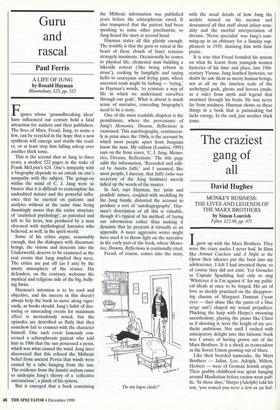Guru and rascal
Paul Ferris
A LIFE OF JUNG by Ronald Hayman Bloomsbury, f25, pp. 522
Figures whose 'groundbreaking ideas' have influenced our century hold a fatal attraction for authors and their publishers. The lives of Marx, Freud, Jung, to name a few, can be recycled in the hope that a new synthesis will emerge and startle the read- er, or at least stop him falling asleep over another thick tome.
This is the second shot at Jung in three years, a modest 522 pages in the wake of Frank McLynn's 624. One's sympathy with a biography depends to an extent on one's sympathy with the subject. The goings-on within the mind of C. J. Jung were so bizarre that it is difficult to contemplate his undoubted stature and the powerful influ- ence that he exerted on patients and acolytes without at the same time being dauntingly aware that the entire structure of 'analytical psychology', as patented and left to his heirs, was produced by a man obsessed with mythological fantasies who believed, as well, in the spirit world.
Some of his critics argue, reasonably enough, that the dialogues with discarnate beings, the visions and descents into the Underworld, deserve to be examined as the real events that Jung implied they were. The critics are put off (as I am) by the musty atmosphere of the seance. His defenders, on the contrary, welcome the mystical and religious side of the big, bully- ing Swiss.
Hayman's intention is to be cool and objective, and his success in this doesn't always help the book to move along vigor- ously, as books should. Jung's habit of doc- toring or misreading events for maximum effect is meticulously noted, but the episodes are described so flatly that they somehow fail to connect with the character himself. One such event famously con- cerned a schizophrenic patient who told him in 1906 that the sun possessed a penis, which was what caused the wind. Jung later discovered that this echoed the Mithraic belief from ancient Persia that winds were caused by a tube hanging from the sun. The evidence from the lunatic asylum came to underpin Jung's theory of a 'collective unconscious', a plank of his system.
But it emerged that a book containing the Mithraic information was published years before the schizophrenic raved. It also transpired that the patient had been speaking to some other psychiatrist, so Jung heard the story at second hand.
Hayman states all this plainly enough. The trouble is that the guru or rascal at the heart of these clouds of fancy remains strangely inanimate. Occasionally he comes to physical life, elemental man building a lakeside retreat ('like being reborn in stone'), cooking by lamplight and saying hello to saucepans and frying pans, where ancestral souls might be lurking — 'trying,' in Hayman's words, `to reinstate a way of life in which we understand ourselves through our gods'. What is absent is much sense of narrative, conceding biography's need to be a story.
One of the most readable chapters is the penultimate, where the provenance of Jung's Memories, Dreams, Reflections is examined. This autobiography, continuous- ly in print since the 1960s, is the account by which most people apart from Jungians know the man. My edition (London, 1995) says on the front cover, 'C. J. Jung. Memo- ries, Dreams, Reflections.' The title page adds the information, 'Recorded and edit- ed by Aniela Jaffe,' and I assumed, like most people, I daresay, that Jaffe (who was secretary of the Jung Institute) merely tidied up the words of the master.
In fact, says Hayman, her 'prim and prudish' nature, coupled with meddling by the Jung family, distorted the account to produce a sort of `autohagiography'. Hay- man's description of all this is valuable, though it's typical of his method, of laying out information rather than making it dynamic that he presents it virtually as an appendix. A more aggressive writer might have used it to throw light on the narrative in the early part of the book, where Memo- ries, Dreams, Reflections is continually cited.
Freud, of course, comes into the story, 'Do my logos clash?' with the usual details of how Jung the acolyte turned on his mentor and denounced all that stuff about infant sexu- ality and the morbid interpretation of dreams. 'Nerve specialist' was Jung's sum- ming-up in an obituary for a Sunday sup- plement in 1939, damning him with faint praise.
It is true that Freud founded his system on what he learnt from youngish women hysterics of his time and place, late 19th- century Vienna. Jung loathed hysterics; no doubt he saw them as messy human beings, not at all on the timeless scale of the archetypal gods, ghosts and heroes (male, as a rule) from myth and legend that swarmed through his brain. He was never far from madness. Hayman shows us these things in a book that is painstaking but lacks energy. In the end, just another thick tome.


















































































 Previous page
Previous page